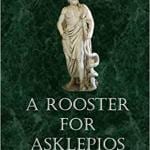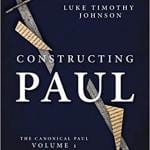Here is a guest post by Max Lee (North Park University) about his book Moral Transformation in Greco-Roman Philosophy of Mind: Mapping the Moral Milieu of the Apostle Paul and His Diaspora Jewish Contemporaries (WUNT 2. Tübingen: Mohr-Siebeck, 2020).
The book will appeal to anyone interested in how early Christianity interacted with its Greco-Roman environment. I attempt something grand and ambitious here: to map the moral universe of the ancient Mediterranean world from which both Diaspora Judaism and early Christianity emerged.
It was Johan Thom (2003), a classicist at Stellenbosch University, who first described the problem and project of trying to find the interconnectedness between diverse moral topoi, or topics of mutual concern, between various religious and philosophical groups in antiquity. My book posits the thesis that moral transformation is an effective way to find internal coherence and interconnectedness between such topoi as emotional control, ethical action and habit, character formation, moral progress, training, mentorship, and deity. It develops systemic models to organize what the major philosophical schools of the Apostle Paul’s day, especially Platonism and Stoicism, taught about the transformation of a vicious soul into a virtuous or perfect person.
The book also functions as a type of handbook which gives a “big picture” view of Platonism and Stoicism as systems of philosophy. The teachings of an individual philosopher are read in their contingent, historical particularity and for how they cohere with the overall tenets of a given philosophical school. This project thus develops independent models of contingency and coherence for each Greco-Roman philosophy of mind. The method was applied by J. Christiaan Becker to Pauline theology (2000), and I have modified it for ancient philosophy.
On one hand, as Abraham Malherbe has argued, every philosopher and their treatises should be examined independently in their own contingent right (i.e., lex Maherbe). Yet, on the other hand, every philosopher of a particular school (e.g., Stoicism and Platonism) is united by one’s fidelity to the teachings of the founder (e.g., Zeno/Cleanthes/Chrysippus and Plato, respectively), and so we can also talk about ‘systems’ of a school based on the interpretation of the founder’s texts and a coherence between its different members. In my study of Platonism, I analyzed mainly the works of Plato, Plutarch, Alcinous, and Galen, and for Stoicism, Zeno, Cleanthes, Chrysippus, Musonius Rufus, Seneca, Epictetus, Marcus Aurelius, and Hierocles.
There are benefits to constructing systemic models for Platonism and Stoicism. Sometimes NT scholars mistakenly read Greco-Roman philosophy through the lens of their classical founders or scholarchs without understanding the areas of continuity and innovation between, for example, Plato and his Middle Platonist heirs, or between Zeno, Cleanthes, and Chrysippus with their Neostoic adherents. The danger here is interpreting or contextualizing ancient philosophical thought from the standpoint of the classical era (5th century B.C.) and missing out on the innovations made in the Greco-Roman era (1st century B.C. to 2nd century A.D.). The idea of mentoring disciples towards moral progress, for example, is a relatively new development among Roman Stoics and not originally taught by the old Stoa. Thus, the models differentiate for the reader areas of continuity and innovation in philosophy between the classical and Roman periods.
Another benefit is the synoptic picture of Greco-Roman antiquity a study of Platonism and Stoicism provides. Troels Engberg-Pedersen (2017) calls this era “the Transitional Period” during which Stoicism and Platonism dominated the moral and intellectual environment of the Roman Empire. During this period, there was considerable interaction between the two philosophical schools where the adherents of each school engaged, rejected, redefined, and appropriated select concepts from their rivals without necessarily compromising their own sectarian identity or school allegiance.
I provide a taxonomy of interaction types between rival schools of thought. I initially posit six basic types of interactions: eclecticism, refutation, competitive appropriation, irenic appropriation, concession, and common ethical usage. These can provide the basis for detecting Paul’s own interactions with concepts of “rival” philosophical and religious traditions. While Paul may not have employed all six types, the taxonomy provides a checklist of possibilities for how he may have interacted with moral discourse of a specific sect, or more widely with a common ancient ethical tradition shared between several sects.
Take, for example, competitive appropriation. This interaction type is the adoption of another school’s linguistic inventory – that is, a rival school’s technical terminology or idioms – in order to redefine and take over what these terms really mean. It is a hostile semantic commandeering of the language deployed by a rival school in order to subordinate the rival’s philosophical concepts to one’s own. Though this is still a controversial topic of debate in New Testament scholarship, some scholars (e.g., N.T. Wright, Richard Horsley, Warren Carter, among others) have argued that Paul’s anti-imperial gospel appropriates key terms of the Empire – such as κύριος or εὐαγγέλιον – and redefines them in distinctly Christian terms.
This is just one of the six basic interactions which Paul could be employing in his letters. For more suggestions, see this blog post (here). There may be more types than the six, and Paul may not utilize all the types which I catalogue in my book (e.g., I doubt that Paul exercises any form of concession to Greco-Roman moral traditions). But having a basic taxonomy gives the biblical interpreter a starting point for critically identifying Greco-Roman allusions in the New Testament. These are meant to be descriptive, not prescriptive, and foundational but not exhaustive.












